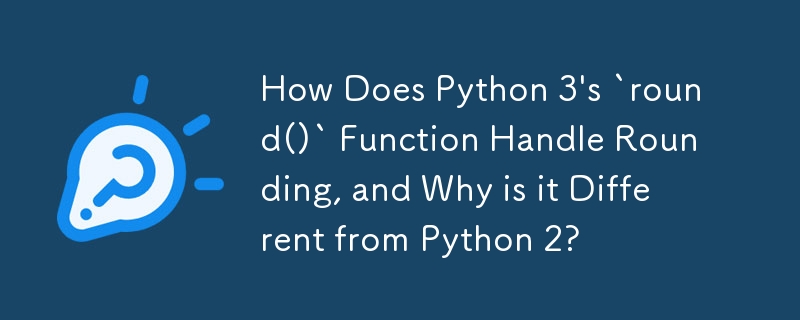 Backend Development
Backend Development
 Python Tutorial
Python Tutorial
 How Does Python 3's `round()` Function Handle Rounding, and Why is it Different from Python 2?
How Does Python 3's `round()` Function Handle Rounding, and Why is it Different from Python 2?
How Does Python 3's `round()` Function Handle Rounding, and Why is it Different from Python 2?

Python 3.x's Rounding Behavior
In Python 3.x, the round() function's rounding strategy has changed significantly compared to Python 2.x. This modification has elicited some confusion and counterintuitive results.
Changed Rounding Strategy
In Python 2.x, halfway cases were rounded away from zero. However, in Python 3.x, these cases are now rounded to the nearest even result. This means that round(2.5) returns 2 instead of 3.
Reasoning Behind the Change
The new rounding strategy, known as "round half to even" or "banker's rounding," is considered the standard rounding method. The previous "always round 0.5 up" technique resulted in a slight bias towards the higher number. This bias could become significant over a large number of calculations.
Other Programming Languages
Python 3.x's rounding behavior is not unique. Several other mainstream programming languages also use banker's rounding, including:
- C#
- Java
- JavaScript
- Perl
However, not all programming languages use banker's rounding by default. Some, such as C , allow developers to specify the rounding method to use.
Banker's Rounding
Banker's rounding is a specific rounding method that rounds ties (e.g., 2.5) to the nearest even result. This method is widely used in finance and statistics because it eliminates the bias towards the higher number.
While Python 3's rounding behavior may initially seem counterintuitive, it is a well-established standard that ensures consistency and accuracy in calculations.
The above is the detailed content of How Does Python 3's `round()` Function Handle Rounding, and Why is it Different from Python 2?. For more information, please follow other related articles on the PHP Chinese website!

Hot AI Tools

Undresser.AI Undress
AI-powered app for creating realistic nude photos

AI Clothes Remover
Online AI tool for removing clothes from photos.

Undress AI Tool
Undress images for free

Clothoff.io
AI clothes remover

AI Hentai Generator
Generate AI Hentai for free.

Hot Article

Hot Tools

Notepad++7.3.1
Easy-to-use and free code editor

SublimeText3 Chinese version
Chinese version, very easy to use

Zend Studio 13.0.1
Powerful PHP integrated development environment

Dreamweaver CS6
Visual web development tools

SublimeText3 Mac version
God-level code editing software (SublimeText3)

Hot Topics
 1377
1377
 52
52
 How to solve the permissions problem encountered when viewing Python version in Linux terminal?
Apr 01, 2025 pm 05:09 PM
How to solve the permissions problem encountered when viewing Python version in Linux terminal?
Apr 01, 2025 pm 05:09 PM
Solution to permission issues when viewing Python version in Linux terminal When you try to view Python version in Linux terminal, enter python...
 How to efficiently copy the entire column of one DataFrame into another DataFrame with different structures in Python?
Apr 01, 2025 pm 11:15 PM
How to efficiently copy the entire column of one DataFrame into another DataFrame with different structures in Python?
Apr 01, 2025 pm 11:15 PM
When using Python's pandas library, how to copy whole columns between two DataFrames with different structures is a common problem. Suppose we have two Dats...
 How to teach computer novice programming basics in project and problem-driven methods within 10 hours?
Apr 02, 2025 am 07:18 AM
How to teach computer novice programming basics in project and problem-driven methods within 10 hours?
Apr 02, 2025 am 07:18 AM
How to teach computer novice programming basics within 10 hours? If you only have 10 hours to teach computer novice some programming knowledge, what would you choose to teach...
 How does Uvicorn continuously listen for HTTP requests without serving_forever()?
Apr 01, 2025 pm 10:51 PM
How does Uvicorn continuously listen for HTTP requests without serving_forever()?
Apr 01, 2025 pm 10:51 PM
How does Uvicorn continuously listen for HTTP requests? Uvicorn is a lightweight web server based on ASGI. One of its core functions is to listen for HTTP requests and proceed...
 How to dynamically create an object through a string and call its methods in Python?
Apr 01, 2025 pm 11:18 PM
How to dynamically create an object through a string and call its methods in Python?
Apr 01, 2025 pm 11:18 PM
In Python, how to dynamically create an object through a string and call its methods? This is a common programming requirement, especially if it needs to be configured or run...
 What are some popular Python libraries and their uses?
Mar 21, 2025 pm 06:46 PM
What are some popular Python libraries and their uses?
Mar 21, 2025 pm 06:46 PM
The article discusses popular Python libraries like NumPy, Pandas, Matplotlib, Scikit-learn, TensorFlow, Django, Flask, and Requests, detailing their uses in scientific computing, data analysis, visualization, machine learning, web development, and H
 How to avoid being detected by the browser when using Fiddler Everywhere for man-in-the-middle reading?
Apr 02, 2025 am 07:15 AM
How to avoid being detected by the browser when using Fiddler Everywhere for man-in-the-middle reading?
Apr 02, 2025 am 07:15 AM
How to avoid being detected when using FiddlerEverywhere for man-in-the-middle readings When you use FiddlerEverywhere...
 How to handle comma-separated list query parameters in FastAPI?
Apr 02, 2025 am 06:51 AM
How to handle comma-separated list query parameters in FastAPI?
Apr 02, 2025 am 06:51 AM
Fastapi ...



